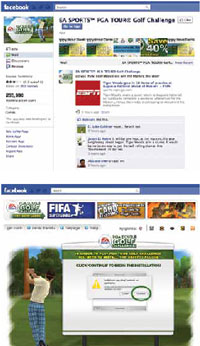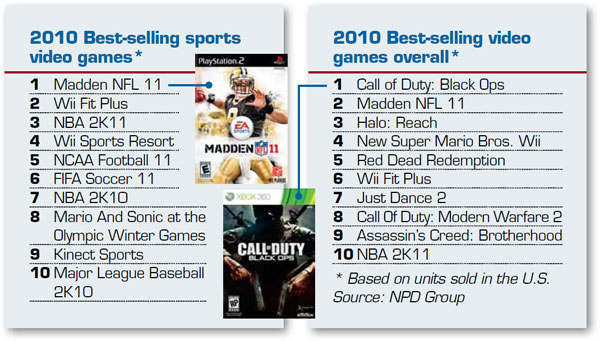EA's "NBA Jam" hasn't met the company's expectations on sales for gaming consoles, but mobile versions for the iPhone and iPad have fared better.
EA SPORTS
The list of top-selling video game titles for 2010 from retail industry tracker NPD Group did not carry much in the way of surprises or any new game franchises whatsoever. Mixed in with perennially popular first-person shooter titles such as "Call Of Duty" and "Halo" were similarly tried-and-true bellwethers of sports video gaming in their latest versions: "Madden NFL 11," "NBA 2K11," and "FIFA 11," each of them stalwarts for more than a decade.
The striking sameness of the list, however, also highlighted an increasingly odd and troubling dynamic of the sports video game industry. As the overall gaming industry continues to grow, with global revenue forecasts for this year surpassing $48 billion, and gaming in general becoming more accessible in part through the steady rise of motion-based play (see story, Page 19), arcade and casually oriented titles using licensed sports intellectual property have still found choppy sales waters.
The "Madden," "FIFA," "NBA 2K" and similar sports game franchises are all ultrarealistic, simulation-based products that seek to re-create everything that happens in those sports in real life. And each of them primarily targets the relatively narrow demographic of males ages 13-35.
The arcade games, conversely, are designed to attract a much wider audience in terms of both age and gender because of their ease of play. But that segment of the business is littered with titles that debuted in recent years to high hopes and often splashy launch marketing, but quickly faded out of existence. "MLB: The Bigs," "NFL Tour," "NFL Blitz," "NHL Hitz," "Facebreaker," "Street" versions of EA Sports' NFL, NBA and FIFA franchises, and "MLB Power Pros" are just a few examples of arcade titles from the past decade that no longer are developed. Most of them had only one or two iterations.
"Before, the only way you could play a sports game was in an arcade-style setting. But as technology has continued to improve, the realism has grown dramatically, and that's what consumers now want."
Michael Pachter
Analyst, Wedbush Morgan Securities
Even more successful entries in this category have often been more complicated than most anything seen among simulation games. EA Sports' initially celebrated revival of "NBA Jam" went through several business strategy changes for its console versions of the game (see story, Page 18), and then did not draw strong initial sales, debuting to less than 50,000 unit sales for the Nintendo Wii in its first month.
The company quickly killed any notion of roster updates for the Sony PlayStation 3 or Microsoft Xbox 360 versions, further signifying weak performance at retail. Mobile versions for Apple's iPhone and iPad, however, have performed much better, briefly ranking as one of the top-grossing applications on iTunes and still holding a top-60 slot for the iPhone as of last week. EA Sports has also supported these versions, costing just $5 each, with roster updates, such as allowing gamers to play with Carmelo Anthony as a New York Knick.
In short, chasing the more casual gamer is one of the hardest things any developer does. Physical sales of sports video games last year in the U.S. declined 24 percent, according to NPD Group data, in part because of a marked retreat in the creation and appeal of casual, arcade-style titles.
"Tastes in the market have simply changed," said Michael Pachter, video game analyst for Wedbush Morgan Securities. "Before, the only way you could play a sports game was in an arcade-style setting. But as technology has continued to improve, the realism has grown dramatically, and that's what consumers now want. And it's not just sports. You couldn't make a cartoony shooter game today and be really successful. And on TV, it's gritty realism, the 'CSI'-type shows, that dominate that market, too."
It's not that game developers haven't seriously tried, though. EA Sports, in particular, several years ago sought to develop two subbrands as a means to create and market casual and arcade fare in a more concerted manner: a Nintendo Wii-based "All Play" moniker and a more general "EA Freestyle" brand. "Freestyle," in turn, was a new attempt at a similar, prior effort with the "EA Sports BIG" brand. None of these are used anymore.
"The name 'EA Sports' we found has a great amount of elasticity in and of itself," said Andrew Wilson, EA Sports' senior vice president of worldwide development. "It's interesting. The whole casual-gamer-versus- hard-core-gamer distinction we make in the industry, it's an odd one gamers don't necessarily make themselves. Sport means a lot of things to a lot of people. In general, though, we need to stay very flexible and offer a wide range of quality gaming experiences to all our consumers."
Resource allocation
To some, the spotty track record for arcade sports games is rather simply explained: The titles are essentially throw-ins to the primary simulation game licenses, and do not get the lion's share of corporate resources with regard to game development or marketing.
2K Sports' exclusive third-party console license with Major League Baseball is a case in point. The developer gained the license in 2005, soon after the NFL signed an exclusive deal with EA Sports for NFL games. The main simulation baseball title, "MLB 2K5," came out that spring and has been revived every year since. The first arcade-style title entry from that license, "MLB: The Bigs," came out two years later, and was created by a different studio, Blue Castle Games, not the Visual Concepts studio that produces all of 2K Sports' main simulation releases.
The various other, now-extinct extensions of the MLB license, such as "MLB: Stickball," "MLB Power Pros," "MLB Front Office Manager," and "MLB Superstars," were similarly farmed out to other studios besides Visual Concepts.
"There is so much money, effort and time invested in that core title, and it has to be good every year," said Scott Steinberg, chief executive of video game and technology consulting firm TechSavvy Global. "Those are the flagships of the product line. So the other titles are going to be inherently secondary. You're not going to find game makers investing primary dollars in what are essentially spin-offs of the core franchise."
But therein lies the rub. Console-based sports arcade games in many instances still cost the same $35 to $60 a copy at retail that the deeper simulation games do. So a consumer faced with a choice in the store almost inevitably is going to select the game that will deliver more hours of play.
"Fans are still choosy with how they spend their money," Steinberg said. "Many of these [arcade] games really need to be right-sized."
Digital future
The strong performance of "NBA Jam" on mobile shows there is still a pent-up demand for lighter, more escapist sports video games, but not necessarily on a gaming console and certainly not at simulation game pricing.
As a result, future arcade and casual games will likely be focused more as downloadable- only, mobile or social network-oriented titles, such as "NHL 3-on-3 Arcade," a $10 game from two years ago; "NBA Jam"; and, more recently, EA's ever-expanding series of Facebook games, such as "World Series Superstars," "Madden NFL Superstars," and "PGA Tour Golf Challenge."
Many of these and similar titles are free to play or cost just a few dollars. But user demands are not nearly as high, either, allowing for more streamlined business models. And primary game fees are often buttressed by in-game advertising and microtransactions. Game play varies widely from lighter versions of comparable simulation titles to entirely different mechanisms more akin to fantasy sports.

EA has been expanding its games on Facebook such as "PGA Tour Golf Challenge."
"You can make a really great Facebook game for $500,000," Pachter said. "That's a big difference from $10 million or $20 million that you would often need to make a game for Xbox 360 or PS3. So there is a much different market out there, and one that in theory could have an infinite lifespan through the updates and refreshes. There is a generation out there we call 'Nintendads' that grew up with the original Nintendo and now are in their 30s with kids. It's still a strong market, and they're still playing casual games."
Liam Callahan, NPD Group senior category specialist, agreed.
"While casual sports games might have smaller sales potential, they may still turn a profit because they cost less to produce," Callahan said.
The challenge to creating successful games in these more social arenas, however, is being able to apply many of the same core development principles to these new platforms.
"Facebook is definitely a big opportunity and social gaming is obviously a big buzzword now," Wilson said. "But you can't just throw something up on Facebook and expect success. And it goes well beyond Facebook. com, too. It's about really engaging consumers in many of the same kind of ways across all these various platforms that we did before just through the console."






